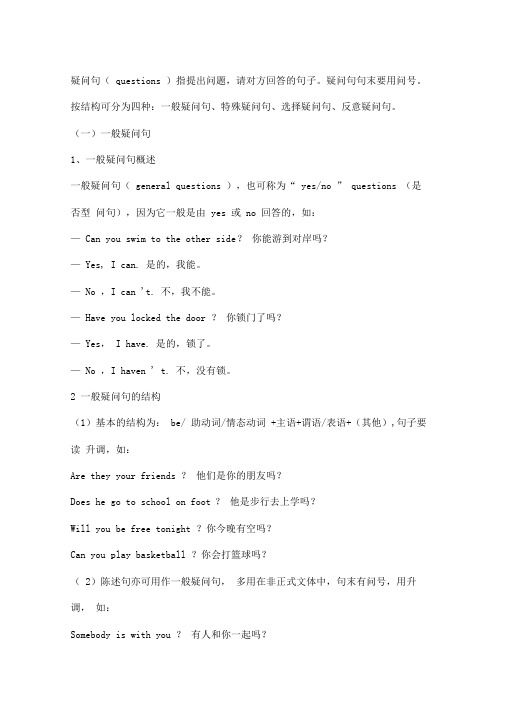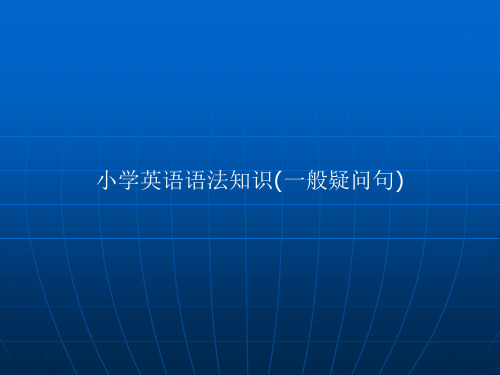语法点:一般疑问句和特殊疑问句讲解
初中英语一般疑问句和特殊疑问句

初中英语一般疑问句和特殊疑问句在英语学习中,一般疑问句和特殊疑问句是非常基础且重要的语法点,它们用于不同的交流情境中。
下面我会分别解释这两种句型的构成和使用方法,并提供一些例句。
一般疑问句一般疑问句用于询问事实或情况是否属实,通常期望对方用"Yes"或"No"来回答。
其构成是在陈述句的句首加上助动词、be动词或情态动词,并将句中的动词变回原形(如果有助动词或be动词,则保留原形)。
构成规则:1.如果句子中有be动词(am/is/are/was/were),则将be动词移到句首。
2.如果句子中有情态动词(can/could/may/might/will/would等),则将情态动词移到句首。
3.如果句子中没有上述两种动词,则根据时态选择相应的助动词do/does/did 放在句首。
例句:-陈述句:She is a student.-一般疑问句:Is she a student? (Yes, she is. / No, she isn't.)-陈述句:They can swim well.-一般疑问句:Can they swim well? (Yes, they can. / No, they can't.)-陈述句:You like coffee.-一般疑问句:Do you like coffee? (Yes, I do. / No, I don't.)特殊疑问句特殊疑问句用于询问具体的、特定的信息,句首使用特殊疑问词(what, who, where, when, why, how等)。
特殊疑问句的构成是特殊疑问词+一般疑问句的语序。
构成规则:1.特殊疑问词放在句首。
2.根据需要选择适当的助动词、be动词或情态动词,并调整语序,使其符合疑问句的结构。
例句:-Who is your favorite singer?-Where do you live?-When did you start learning English?-Why are you late today?-How do you usually go to school?通过掌握这些基本规则和例句,你可以更有效地在日常对话中使用一般疑问句和特殊疑问句。
一般疑问句和特殊疑问句讲解

一般疑问句在英语的学习中,一般疑问句的转换及回答是经常碰到的问题,现在我们就来探讨一下有关一般疑问句的问题。
一、什么是一般疑问句用Yes或No作答的疑问句叫一般疑问句。
一般疑问句还有下列特点:1、以be动词、助动词或情态动词开头;例:Is your father a teacher? Does Catherine like animals? Can Jenny speak Fr ench?2、往往读升调;3、译成汉语,都可以带上“吗”,例如上面三句可分别译为:你父亲是老师吗?凯瑟琳喜欢动物吗?詹妮会说法语吗?二、例何将陈述句变成一般疑问句?要将陈述句变成一般疑问句,可以遵循下列步骤:1.看句中有没有be动词(am、is、 are、 was、 were)、助动词(do、does、did、 have、 had)或情态动词(can、must、will、may等),如果有,将其提到句首,句末打上问号即可。
例:It was rainy yesterday. →Was it rainy yesterday?Tom's father can play the piano.→Can Tom's father play the piano? I have finished my homework.→Have you finished your homework?2.如果句中没有be动词、助动词或情态动词,则根据谓语动词的形式借助do的相应形式放在句首。
具体方法是:如果谓语动词是原形,则借do;如果谓语动词是一般现在时第三人称单数形式,则借does;如果谓语动词是过去式,则借did. 需要注意的是,借does或did后,原句的谓语动词要变回原形。
例:They go to school by bike. →Do they go to school by bike? Bill gets up at 6:30 every day.→Does bill gets up at 6:30 every day? The students saw a film yesterda y.→Did the students see a film yesterday?三.陈述句变一般疑问句应注意的事项陈述句变成一般疑问句除了遵循上述规则以外,还应注意下列几点:1.如果陈述句中有第一人称,则变问句时最好要变为第二人称。
一般、特殊、选择疑问句专题讲解(附习题答案)

“一般疑问句”【概念】: 一般疑问句是指用Yes / No来回答的疑问句,读时要用升调。
eg: ---Is this your pencil 这是你的铅笔吗---Yes, it is. 是的,它是。
:--- Are those bananas 那些是香蕉吗--- No, they aren’t. 不,它们不是。
【结构】:1. 连系动词be +主语+其他回答时主语必须为相应的人称代词,且为主格形式。
肯定回答:Yes, 主语+ be.否定回答:No, 主语+ be not.be和not可缩写为:isn’t, aren’t, wasn’t, weren’t【例句】①—Are they all here 他们都在这儿吗—Yes, they are. / No, they aren’t. 是的,他们都在。
/不,他们不在。
)②—Is your father a musician—No, he is.2. 情态动词+ 主语+动词原形+其他肯定回答:Yes, 主语+情态动词.否定回答:No, 主语+情态动词+ not.情态动词和not可缩写为:can’t, mustn’t, needn’t, shouldn’t.【例句】①— Can the boy play the guitar 那个男孩会弹吉他吗---Yes, he can. / No, he can’t. 是的,他会。
/ 不,他不会。
②—Can you swim—Yes, I can.[3. 助动词( Do / Does / Did)+主语+动词原形+其他肯定回答:Yes, 主语+ do / does / did.否定回答:No, 主语+ do / does / did+ not.(助动词和not也常用缩写形式:don’t, doesn’t, didn’t.【例句】①—Do you want to go to the movie 你想去看电影吗—Yes, I do. / No, I don’t. 是的,我想去。
(完整版)英语一般疑问句和特殊疑问句的讲解及练习

一般疑问句用be动词(am /is主语+其他成分,+主语+提问的词.否定:No,+主语+提问的词+not.Are you from Japan﹖Yes ,I am./ No, I'm not.Is her sister doing her homework now﹖Yes, she is./ No, she isn't.Does he work in a bank﹖Yes, he does./ No, he doesn't.Can you speak French﹖Yes, I can./ No, I can't.一: 般疑问句还有下列特点:1、以be动词、助动词或情态动词开头;例:Is your father a teacher? Does Catherine like animals? Can Jenny speak French?二: 如何将陈述句变成一般疑问句?1.如句中有be 动词(am、is、are、was、were can、may、must …)或助动词(do、does、did、have、had(完成时中))时,可直接将它们提到句首,句末打上问号即可。
主语为第一人称,应将其改为第二人称。
例:It was rainy yesterday.→Was it rainy yesterday?Tom's father can play the piano.→Can Tom's father play the piano?I have finished my homework.→Have you finished your homework?2.如果句中没有be动词、助动词或情态动词,则根据谓语动词的形式借助do的相应形式放在句首。
具体方法是:如果谓语动词是原形,则借do;如果谓语动词是一般现在时第三人称单数形式,则借does;如果谓语动词是过去式,则借did. 需要注意的是,借does或did后,原句的谓语动词要变回原形。
英语中一般疑问句和特殊疑问句的区别

英语中一般疑问句和特殊疑问句的区别一般疑问句和特殊疑问句是英语语法中两种不同类型的问句。
一般疑问句是用于向对方询问某个陈述句是否属实,通常需要以助动词或be动词开头,并使用倒装结构。
例如:
1.You like coffee.(你喜欢咖啡。
)
2.Do you like coffee?(你喜欢咖啡吗?)
在这个例子中,将原陈述句中的"like"动词提取出来,并使用助动词"do"形成疑问句。
特殊疑问句则是用于询问某个特定信息或事实的问句,通常以特殊疑问词开头。
特殊疑问词包括who(谁)、what(什么)、when (何时)、where(哪里)、why(为什么)、how(如何)。
例如:
1.She went to the party.(她去了派对。
)
2.Where did she go?(她去了哪里?)
在这个例子中,特殊疑问词"where"引导了疑问句,并询问了去派对的地点。
总结起来,一般疑问句主要用于确认陈述句的真实性,通常采用助动词或be动词的倒装形式,而特殊疑问句则用于询问特定信息或事实,以特殊疑问词开头。
一般疑问句、特殊疑问句、选择疑问句、反义疑问句地详细用法

疑问句( questions )指提出问题,请对方回答的句子。
疑问句句末要用问号。
按结构可分为四种:一般疑问句、特殊疑问句、选择疑问句、反意疑问句。
(一)一般疑问句1、一般疑问句概述一般疑问句( general questions ),也可称为“ yes/no ” questions (是否型问句),因为它一般是由 yes 或 no 回答的,如:— Can you swim to the other side ?你能游到对岸吗?— Yes, I can. 是的,我能。
— No ,I can 't. 不,我不能。
— Have you locked the door ?你锁门了吗?— Yes, I have. 是的,锁了。
— No ,I haven ' t. 不,没有锁。
2 一般疑问句的结构(1)基本的结构为: be/ 助动词/情态动词 +主语+谓语/表语+(其他),句子要读升调,如:Are they your friends ?他们是你的朋友吗?Does he go to school on foot ?他是步行去上学吗?Will you be free tonight ?你今晚有空吗?Can you play basketball ?你会打篮球吗?( 2)陈述句亦可用作一般疑问句,多用在非正式文体中,句末有问号,用升调,如:Somebody is with you ?有人和你一起吗?He didn ' t finish the work ?他没有做完活吗?You are fresh from America , I suppose ?我猜,你刚从美国回来吧?3、一般疑问句的答语( 1)一般疑问句一般由 yes 或 no 来回答,如:— Are you tired ?你累了吗?— Yes,I am. 是的 ,累了。
— No, I ' m not. 不,不累。
— Does she do the cleaning ?她扫除了吗?— Yes , she does. 是的,她打扫了。
小学英语语法---一般疑问句和特殊疑问句

就划线部分提问:(变特殊疑问句) This is a book. 第一步:变一般疑问句
Is this a book? 第二步:找合适的特殊疑问词
Is this what ? 第三步:特殊疑问词提前放到句首,并大写, 其余按顺序照抄,省略划线部分。
What is this?
变否定句的做法:
1、如句子里是be动词:am,is,are,was,were 就在这些词后加
3、如句子里是情态动词是must,can,may,should 就在这些词后 加not
例句:You can watch TV now. You can not watch TV
now.
小学英语语法知识(一般疑问句)
一般疑问句:
表示疑问,一般回答只有两种可能Yes,……或 No,……句中没有疑问词。
如何将一个肯定的陈述句改为否定句:
1、看句中有无be动词,如有,把be动词提到句首即 可。、如上述二者都没有,就应把助动提到句首。分四 个步骤:
What date 什么日期 问日期 What for 为何目的 问目的 How 。。。。怎样 问情况 How old 多大年纪 问年纪 How many 多少数量(可数名词) 问数量 How much 多少钱;多少数量(不可数名词) 问多少钱或数 量(不可数)
How about 。。。。怎么样 问意见 How often 多久 问频率 How long 多长时间 问时间长度 How far 多远 问多远;多长距离
(1)肯定陈述句中本来是没有助动词的,要加上去, 位置在主语(某人或某物)后,动词前。
(2)确定助动词用do、does还是did,根据句中动 词,动词是原形的助动词就用do,动词是第三人称 单数的助动词就用does,动词用过去式的助动词就 有did。 (3)把助动词后提到句首。 (4)原句中动词假如发生变化就要恢复成原形。 强调一点,有some的要考虑是否要用any。
德语语法 疑问句

德语语法:疑问句详解德语的疑问句主要有两种形式:一般疑问句和特殊疑问句。
一、一般疑问句1、一般疑问句就是没有疑问词的疑问句。
在一般疑问句中,变位动词、助动词或情态动词位于句首。
回答时要用ja或nein回答。
这类疑问句的语调是升调。
Kommen Sie morgen?Ja,ich komme./Nein,ich komme nicht.Hast du Zeit?Ja,ich habe Zeit./Nein,ich habe keine Zeit.Möchtest du eine Tasse Kaffee?Ja,gern./Nein,danke.(二虚拟:客气的请求或询问)2、问句如果是否定问句时,用nein来表达肯定的回答,用doch来引导表示否定的回答。
Hast du keine Lust?Nein,ich habe keine Lust.(是的,我没有兴趣)Doch,ich habe Lust.(不,我有兴趣)Sind Sie nicht zufrieden?Nein,ich bin nicht zufrieden. (是的,我不满意)Doch,ich bin zufrieden.(不,我满意)3一般疑问句有时也以陈述句的形式出现,只是在语调上说明是个疑问句。
Du kommst aus China?Ich habe das nicht gesagt?二、特殊疑问句以特殊疑问词wer,was,wann,wo,wie,warum等开头的疑问句被称为特殊疑问句。
语调一般为降调。
1、语序为:疑问词+变位动词+主语?Was ist das?Wann kommst du?2、有些疑问词有格的变化。
例如:wer,welch-,was für ein.(1)对人提问(2)welch-【哪个;哪些】在不同的人或物中进行选择的时候welch-进行提问,有性、数Welche Tasche hat dir gefallen?哪个手提包你很喜欢?Welches Buch brauchst du?你需要哪本书?(3)was für ein它主要用来对“作为定语的形容词进行提问。
- 1、下载文档前请自行甄别文档内容的完整性,平台不提供额外的编辑、内容补充、找答案等附加服务。
- 2、"仅部分预览"的文档,不可在线预览部分如存在完整性等问题,可反馈申请退款(可完整预览的文档不适用该条件!)。
- 3、如文档侵犯您的权益,请联系客服反馈,我们会尽快为您处理(人工客服工作时间:9:00-18:30)。
一般疑问句一、什么是一般疑问句1.定义:用Yes或No作答的疑问句叫一般疑问句。
2.特点:1、以be动词、助动词或情态动词开头;eg: Is your father a teacher?Does Catherine like animals?Can Jenny speak French?2、往往读升调;3、译成汉语,都可以带上“吗”eg: 上面三句可分别译为:你父亲是老师吗?凯瑟琳喜欢动物吗?詹妮会说法语吗?二.陈述句和一般疑问句间的转换要将陈述句变成一般疑问句,可以遵循下列步骤:1.看句中有没有be动词(am、is、are、was、were)助动词(do、does、did、have、had)或情态动词(can、must、will、may等),如果有,将其提到句首,句末打上问号即可。
eg: It was rainy yesterday.→Was it rainy yesterday?Tom's father can play the piano.→Can Tom's father play the piano?I have finished my homework.→Have you finished your homework?2.如果句中没有be动词、助动词或情态动词,则根据谓语动词的形式借助do的相应形式放在句首。
具体方法是:如果谓语动词是原形,则借do;如果谓语动词是一般现在时第三人称单数形式,则借does;如果谓语动词是过去式,则借did. 需要注意的是,借does或did后,原句的谓语动词要变回原形。
eg:They go to school by bike.→Do they go to school by bike?Bill gets up at 6:30 every day.→Does bill gets up at 6:30 every day?The students saw a film yesterday.→Did the students see a film yesterday?陈述句变一般疑问句应注意的事项陈述句变成一般疑问句除了遵循上述规则以外,还应注意下列几点:1.如果陈述句中有第一人称,则变问句时最好要变为第二人称。
eg:I usually have lunch at school.→Do you usually have lunch at school?My father is playing soccer.→Is your father playing soccer?2.如果陈述句中有some, 则变问句时往往要变成any 。
eg:There is some water on the playground.→Is there any water on the playground?3.复合句变一般疑问句通常只变主句,从句不变。
eg:I know he comes from Canada.→Do you know he comes from Canada?三.一般疑问句往往采用简短回答由三部分(三个单词)组成,对这三部分(三个单词)的确定可以概括例下:1.第一个词:不是Yes就是No。
(有时根据语气的不同,Yes可由Sure, Certainly, Of course等代替.NO可由sorry 代替.)2.第二个词:问谁答谁。
即答语中的主语须与问句的主语一致(但必须用主格代词)。
eg:Does she clean her room every day? Yes, she does.Is Anna′s father a doctor? No,he isn′t.如果主语是this that,回答时用it 代替,如果问句中主语these, those,回答时用they′ 代替。
3.第三个词:用什么问,用什么答。
即沿用问句中的引导词。
Can Jim play soccer? Yes, he can.Does Mr Bean speak English? Yes, he does.需要注意问题:(1).用may 引导的问句,肯定回答用may,否定回答用can′t 或mustn′t用must 引导的问句,肯定回答用must,否定回答用needn′t.eg:May I go to the park now?Yes, you may. /No, you mustn′t.Must I wash my clothes now?Yes, you must. /No, you needn′t.4.用No开头作否定回答时,结尾要加上not。
因为回答必须是三部分,所以否定回答必须缩写,而肯定回答不能缩写。
eg:Did Thomas come here yesterday?Yes, he did./ No ,he didn′t.Is Lin Lin in Class 3?Yes, she is. / No, she isn′t.或(No, she′s not).一般疑问句练习题1. His father is an English teacher.2. These cats are crying.3. They can swim.4. I like to read English.5. I go to school on foot.6. He likes English.7. His father goes to work by bus.8. He is crying under the tree.9. His birthday is on the twentieth of November.10. Mrs. Li and Kitty are in a big shop.11. Kitty is wearing her new uniform.12. The boy under the tree is hungry.13. He goes to school every day.15. I want to have a model car.16. She wants a cup of coffee.17. Mrs. Li and Kitty watch television at night.18. I do my homework after school.特殊疑问句一. 定义:以疑问词开头,对句中某一成分提问的句子叫特殊疑问句。
常用的疑问词有:what, what color, what nationality, what day, who二.构成①特殊疑问词+助动词+主语+动词原形+其他?eg:Where do you do study English?②特殊疑问词+be动词+主语+其他?eg:Why is your Mum so angry?③特殊疑问词+情态动词+主语+动词原形+其他?eg:What can I do for you?三.回答特殊疑问句时,不能用yes /no,即问什么答什么,尤其是简略回答。
如:-Who is from Canada﹖-Helen (is).- Where's the restaurant﹖- Near the station.-Why do you like koalas﹖-Because they are cute.单词意思用法when什么时间问时间who谁问人whose谁的问主人where在哪里问地点which哪一个问选择why为什么问原因what什么问东西what time什么时间问时间what colour什么颜色问颜色what about…怎么样问意见what day星期几问星期what date什么日期问具体日期what for为何目的问目的how…怎么样问情况how old多大问年龄how many多少问数量how much多少问价钱how about…怎么样问意见how far多远问路程特殊疑问句练习题(一)1._____ is that pretty girl? She is my sister.2.._____ are Jack and Tom? They are behind you.3._____ do you go to school? I go to school from Monday to Friday.4._____ has a beautiful flower? John has a beautiful flower.5._____ are they? They are my parents.6._____ is my mother? She is in the living room.7._____ are you going? We are going to the bakery(面包坊).8._____ do Jim and Wendy play ball? They play ball in the afternoon.9._____ does he jog? He jogs in the park.10._____ are you from? I'm from Changchun city.1、A: _______ is the boy in blue? B:He’s Mike.2、A: _______ wallet is it? B:It’s mine.3、A: _______ is the diary? B:It’s under the chair.4、A: _______ is the Chirstmas Day? B: It’s on the 25th of December.5、A: _______ are the earphones? B:They are 25 yuan.6、A: _______ is the hairdryer? B:It’s blue.7、A: _______ is it today? B:It’s Sunday.8、A: _______ was it yesterday? B: It was the 13th of October.9、A: _______ this red one? B:It’s beautiful.10、A: _______ is it from here? B:It’s about two kilometre away.11、A: Can I have some paper and some crayons?B: _______ ? A: I want to make a kite.12、A:_______ one is fatter, the blue one or the red one? B: The blue one.13、A:_______ is your cousin? B: He’s 15 years old.14、A:_______ do you have dinner? B: At 6 o’clock.二、就画线部分提问1.He is my father.2.They are under the tree.3.I often watch TV after dinner.(晚饭后) 提示:饭后强调的是时间问题。
